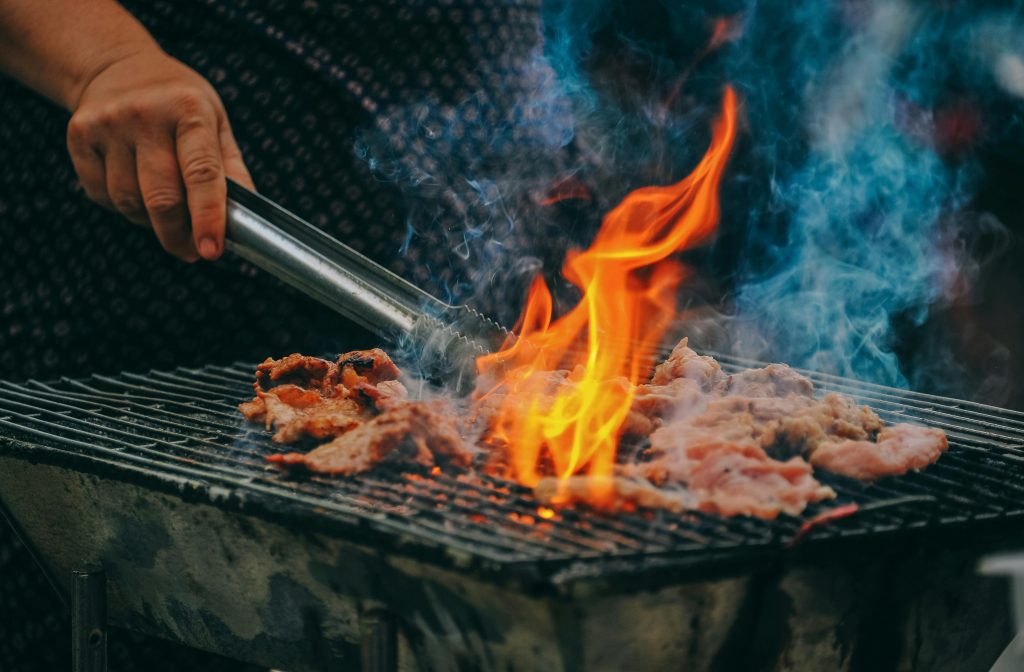All fields are required
Posted in Food Safety,Our Blog on May 18, 2025

I like to think that grilling is a year-round thing here, but truth be told once the temperature dips below 50 I don’t prefer to be outside as much. But when we have bright sunny days there is something to be said about a meal cooked outside on the grill. Here are some summer grilling safety reminders to brush up on as the season is officially upon us!
These tips start at the store and end on the plate. First things first buy your meats and anything cold last. What I mean by that is add it to the cart right before check out. Always put your meats in the provided bags in stores to ensure that the juices do not drip on anything and cause cross contamination.
At home, place meat and poultry in the refrigerator immediately. Freeze poultry and ground meat that won’t be used in 1 or 2 days; freeze other meat within 4 to 5 days.
Safe Thawing:
Completely thaw meat and poultry before grilling so it cooks more evenly. Use the refrigerator for slow, safe thawing or thaw sealed packages in cold water. You can microwave to defrost if the food will be placed immediately on the grill.
How to Marinate:
Most recipes for marinating meat and poultry recommend anywhere from six to 24 hours. It is safe to keep the food in the marinade longer, but after two days it is possible that the marinade can start to break down the fibers of the meat, causing it to become mushy. Always marinate meat and poultry in the refrigerator, not on the counter.
If some of the marinade is to be used as a sauce on the cooked food, reserve a portion of the marinade before putting raw meat and poultry in it.
Boil the used marinade if you want to brush it on the meat or poultry while it’s grilling. Whenever marinade used on raw meat or poultry is to be reused, make sure to let it come to a boil for a few minutes to destroy any harmful bacteria. Then store the marinade in shallow containers in the refrigerator for later use.
Keep your cold foods cold at all times.
When using a cooler, keep it out of the direct sun by placing it in the shade or shelter. Avoid opening the lid too often, which lets cold air out and warm air in. Pack beverages in one cooler and perishables in a separate cooler.
Store raw meat and poultry in well-sealed packages in the bottom of the cooler underneath other food items. This will help to avoid cross-contamination. If poultry juice leaks onto other meats, then that meat needs to be cooked to an internal temperature of 165 F.
Keep it Clean
Be sure there are plenty of clean utensils and platters. To prevent foodborne illness, don’t use the same platter and utensils for raw and cooked meat and poultry. Harmful bacteria present in raw meat and poultry and their juices can contaminate safely cooked food.
If you’re eating away from home, find out if there’s a source of clean water. If not, bring water for food preparation, washing hands, surfaces and utensils. Otherwise, pack clean cloths, alcohol-based moist towelettes and hand sanitizer. Make sure sanitizers have at least 60% alcohol content.
Cook Until Done
Cook food to a safe minimum internal temperature to destroy harmful bacteria. Meat and poultry cooked on a grill often browns very fast on the outside. Use a food thermometer to be sure the food has reached a safe minimum internal temperature. Cook beef, pork, veal, and lamb (steaks, roasts and chops) to 165°F and allow to rest for 3 minutes. Hamburgers made of ground beef, pork, veal, and lamb should reach 165°F. All poultry (including ground) should reach a minimum of 165 °F.
NEVER partially grill meat or poultry and finish cooking later.
Keep Hot Food Hot
After cooking meat and poultry on the grill, keep it hot until served — at 140 °F or warmer.
Keep cooked meats hot by setting them to the side of the grill rack, not directly over the coals where they could overcook. At home, the cooked meat can be kept hot in an oven set at approximately 200 °F, in a chafing dish or slow cooker, or on a warming tray.
Safe Serving
When taking food off the grill, use a clean platter. Don’t put cooked food on the same platter that held raw meat or poultry. Any harmful bacteria present in the raw meat juices could contaminate safely cooked food. In hot weather (above 90 °F), food should never sit out for more than 1 hour.
Don’t Let Leftovers Make You Sick
Refrigerate any leftovers promptly in shallow containers. Discard any food left out more than 2 hours (1 hour if temperatures are above 90 °F).
REMEMBER! Always refrigerate perishable food within 2 hours. Refrigerate within 1 hour when the temperature is above 90 °F.
For more grilling and outdoor cooking food safety information please keep an eye on Make Food Safe!